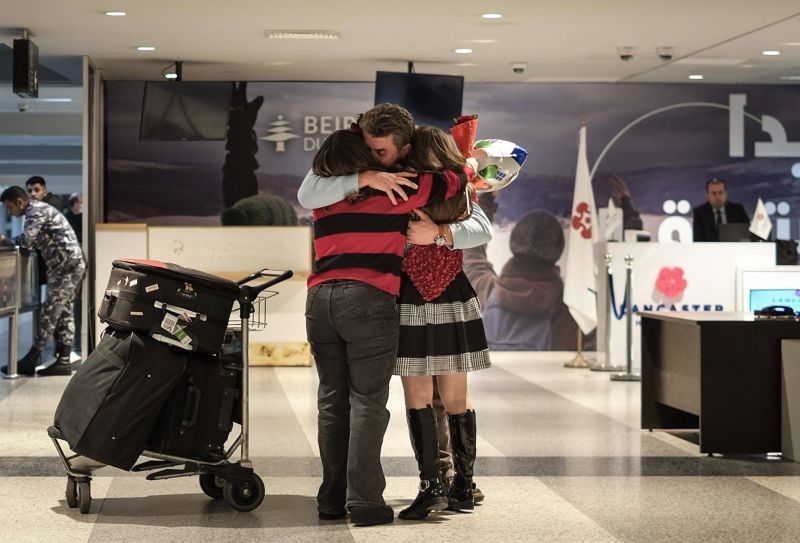
A scene from Beirut's airport. (Credit: Joao Sousa)
The ever-intensifying conflict between Hamas and Israel has sent shockwaves throughout the Middle East and beyond and the prospect of Lebanon becoming involved is causing concern among the Lebanese diaspora.
Since Sunday, crossfire between Hezbollah and the Israeli army near the border left caused casualties on both sides and triggered fears of a new war between the two countries.
As the tension escalates, many Lebanese people are saying they feel their home is teetering on the edge of another 2006 war.
To those from South Lebanon, this is nothing new. They “have lived through more than one war,” says Ali Katour who is from Sour, and now lives in Gabon. Katour’s family still lives in Sour.
“We don’t hope for war of course, but when a war breaks out, we are prepared, morally, for anything that might happen,” he says. “We understand what an enemy operation on Lebanon means and we are not afraid.”
Katour, who runs a Lebanese diaspora community news website and owns an electronics business, left Lebanon in 2004, when he was just 22.
"In South Lebanon, missiles have fallen on our houses. We are used to it,” he says.
“As southerners, we feel that Palestine is our cause too and we are prepared to stand by our brothers.”
‘Waiting for the unknown’
Hayan Abdallah, a 29-year-old Lebanese man living in Paris, says he is glued to local Lebanese news channels and newspapers and avidly following the latest updates on the situation back home.
Abdallah grew up in Saida, though his family is from Khiam, a border town. He has been in close contact with his relatives since Saturday.
"What's happening in Palestine and the prospects of what might happen in Lebanon is unprecedented and shocking," Abdallah tells L’Orient Today over the phone.
On Monday, several residents of Khraybeh, another border town in the south, confirmed being hit by Israeli fire Sunday afternoon. Earlier that day, Israeli forces responded to Hezbollah’s attack on the Shebaa Farms with an artillery barrage on Kfar Shouba in southern Lebanon.
Abdallah calls in to check on his family whenever he catches news of shelling in the south.
While he keeps an eye on TV channels and newspapers to stay informed, he makes it a point to avoid social media, “to keep myself sane and less stressed.”
On social media, “things are all over the place, especially here in Europe.”
Despite the stress, which he likens to “waiting for the unknown,” Abdallah believes Lebanon won't necessarily plunge into a full-scale war with Israel. He has no immediate plans to move his parents out of the country.
“But we need to see how things unfold because you never know, things might change at any given moment,” he notes.
Abdallah was planning a visit to Lebanon for a month this fall, but canceled his trip before tensions broke out. “I’m glad I ended up not going,” he says.
“But at the same time, I wish I was closer to my family during these times, without having to communicate with them from a distance over the phone.”
‘We watch the news before we sleep and once we wake up’
“Those of us who live abroad always receive the bad news more strongly than those who live in the heart of the situation,” says Amal Daher, a 38-year-old woman who has been living in Dubai for the past two years. “Our hearts are aching for our families back home.” Daher’s family lives in Beirut.
"We watch the news before we sleep and once we wake up then check on our families, and they tell us not to worry about them,” she said.
Her parents and her husband's parents are old and the thought of evacuating them from Lebanon in the event of a war is a challenging prospect.
"They will refuse to leave Lebanon in all cases," Daher laments.
The recent Israeli assault on Shebaa, her husband’s home town, has heightened her anxiety. "The situation is more difficult with that fact and we are monitoring the events which are naturally more tense there," she says.
“The observatory just across from the house of my husband’s family was struck,” she adds.
Now that the family lives in the shadow of fear, they are trying “to convince my brother's wife, who is visiting Lebanon, to leave back to Dubai,” she added.
‘I feel bad that I am abroad’
Nadida Raad, a 35-year-old Lebanese woman living in Belgium, left the country a year and a half ago due to the crisis.
Her family is from Tripoli, a city that could be less directly affected by the conflict. Either way, she is experiencing constant anxiety about the potential escalation of war.
“Ever since the situation got tense, I have been checking the news either on Instagram or online publications or I consult friends with a stronger grasp of the political landscape to gain insight into what might happen,” Raad says.
Despite the unsettling circumstances, she has booked a ticket to Lebanon with plans to visit her family and friends during Christmas vacation in mid-December.
She ultimately decided to visit because she misses her loved ones, especially her long-distance boyfriend.
“I am terrified to come, of course, but I am still visiting no matter what happens, in fact, I feel bad that I am abroad now.”
Her parents, however, are scared and her mother is already trying to dissuade her from visiting.
"You can expect anything in a war — what if the internet gets cut off and I can't contact my loved ones?" Raad frets.
As for the possibility of helping her parents leave Lebanon in the event of war, Raad says she does not have the means.
“I haven't been working here long enough to be able to bring in anyone," she explains.
The same predicament applies to her sisters, one living in Canada and the other in Ireland, who also cannot help their parents escape in the event of a war.
“But regardless, our parents are only getting older and are alone [in Lebanon] and they [...], would refuse to get out,” she says. “They won’t even consider leaving Tripoli, let alone the country, so it is out of the question."
